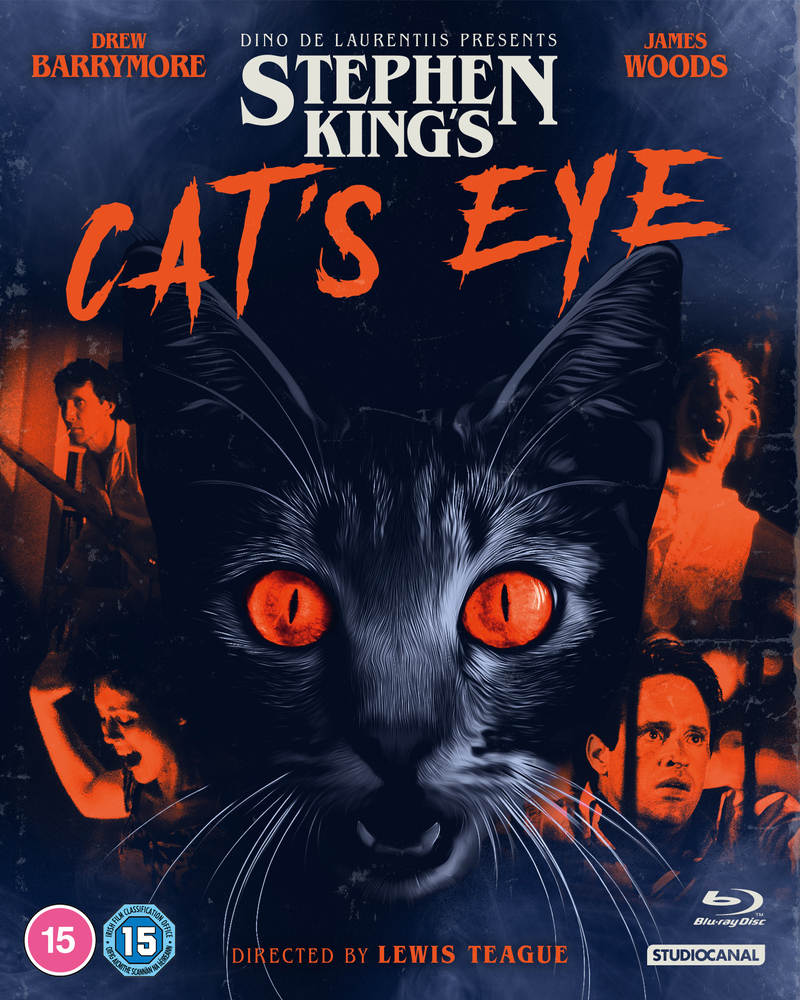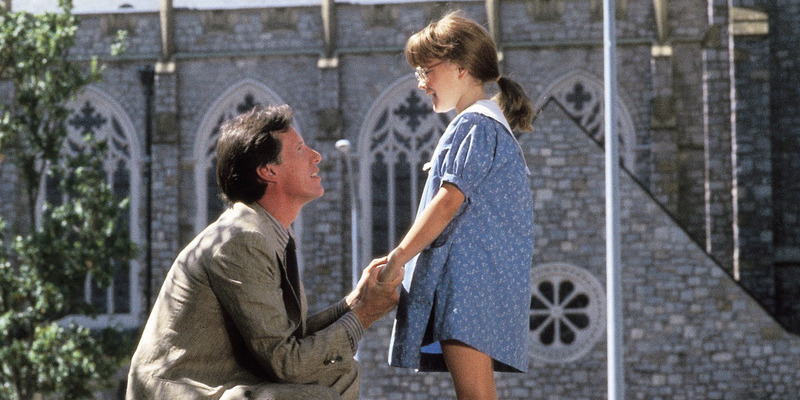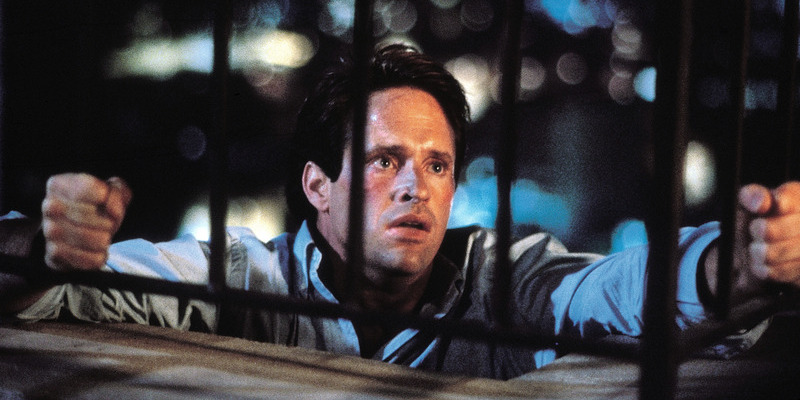
Review by
Eric Hillis
Directed by: Lewis Teague
Starring: Drew Barrymore, James Woods, Robert Hays, Alan King,
Candy Clark

Though somewhat lost in the mix of Stephen King movies now,
1985's Cat's Eye was a big deal at the time, marking only
King's second outing as a screenwriter. 1985 was the time I started
reading movie magazines, and the image of the movie's goblin seemed to
adorn every sci-fi and horror publication's front cover in the months
leading to its release. King wasn't the only draw however. Returning to
the King world was director Lewis Teague, who two years earlier
had done a fine job adapting the author's
Cujo. Drew Barrymore, the breakout young star of
ET and King adaptation Firestarter, was given a major role, while the man responsible for creating ET, FX
wiz Carlo Rambaldi, was brought on board to create the
aforementioned goblin. Add cinematography by the legendary
Jack Cardiff and an appearance by then rising star
James Woods, and Cat's Eye had much to excite 1980s
movie fans.
Also seeing the release of Silver Bullet, 1985 marked the end of the golden era of King horror adaptations.
From that point on worthwhile adaptations of King's horror tales would
be few and far between, with movies based on his non-supernatural fare
(The Shawshank Redemption, Misery, Stand by Me) finding most acclaim. Cat's Eye sees King riding the
crest of a wave, adapting two of his own short stories and creating a
third from scratch for an anthology loosely connected by the presence of
a stray cat.

The moggy first arrives in Manhattan, where it is scooped up off the
street by what first appears a benevolent guardian angel. Unfortunately
for the animal it's now in the hands of Quitters Inc, a company that
uses ruthless tactics to "help" its clients quit smoking. Dick Morrison
(Woods) signs up for the programme and is shocked to see the cat
subjected to jolts of electricity. If Dick doesn't follow through and
kick the habit, he's told his wife and daughter will be subjected to the
same torture.
This new 4K restoration of Cat's Eye opens with a
disclaimer warning that the film features outdated attitudes. Maybe I'm
not as sensitive as others, but I couldn't decipher what this refers to,
as racism, sexism or homophobia didn't seem present in any way. I can
only assume that it refers to the copious amount of smoking seen in the
opening segment. The movie takes a very '80s libertarian attitude to a
habit most of us now recognise as having no positive effects, with
Quiiters Inc representing the encroaching nanny state, a major talking
point at the time. It's fitting that the target of this authoritarianism
is played by Woods, given his current political beliefs. Woods is
excellent as a man so addicted to nicotine he's willing to risk the
lives of his family for a sneaky drag, and Alan King is
thoroughly menacing as the sinister head of Quitters Inc (there's
something about aging Jewish comics that makes them great at playing
villains – see also Don Rickles in Casino and Albert
Brooks in Drive). Of the three stories it's the one that works best as a standalone
segment, with a payoff straight from EC Comics.

Next we find our feline observer taken in by Atlantic City mobster
Cressner (Kenneth McMillan), who abducts his wife's lover, tennis
player Johnny Norris (Robert Hays), and offers him a bet. If
Johnny can walk around the thin ledge of his high-rise penthouse without
falling to his death, he can go free; otherwise the police will be
alerted to the stash of heroin planted in the trunk of his car. Johnny
accepts the challenge and makes his way cautiously around the building,
dodging stray pigeons and Cressner's attempts to knock him off
course.
While this segment doesn't fully work as a short in its own right, it
does feature a memorably vertigo-inducing set-piece. Even in 4K, the
visual effects hold up, with matte paintings beautifully integrated to
make us believe Hays really is 50 storeys above the sidewalk. You can
see why Cardiff was hired, as four decades earlier he had similarly
helped make audiences believe an Indian palace was located high in the
Himalayas for Powell and Pressburger's Black Narcissus.

The movie closes out with its most 1980s segment. Presumably cashing in
on the success of Gremlins, the final story sees the cat battling a small goblin intent on
stealing the breath of young Amanda (Barrymore). It's a classic tale of
disbelieving parents and monsters under the bed, with a clever use of a
record player turntable to dispatch its diminutive demon.
The fact that none of its three segments could be described as "filler"
puts Cat's Eye in the top tier of horror anthologies.
Teague is something of an under-rated director who never got the props
of his fellow graduates from the Roger Corman school. Working under
Corman gave Teague a keen sense of how to get the most from a small
budget. This stands him well with Cat's Eye, a movie that looks far more polished than its relatively minor budget
should allow. King devotees should look out for several references to
his work peppered throughout.

